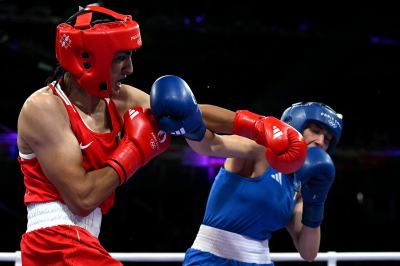Men don’t belong in women’s sports, especially at the Olympics

It’s no surprise that with the “inclusion” of men into the realm of women’s sports we’ve seen them dominate. It’s almost like they are built entirely different. It’s a reality that millions of people seek to dismiss — there are XX chromosomes, and there are XY chromosomes. No, they aren’t the same and no, you can’t switch.
Sadly, if you listen or read any major news outlet — the opinion sways heavily the other way. In fact, those who identify as something other than what they were born as are celebrated, awarded, and given special treatment.
With the Olympics reaching its peak, the controversy over the male athletes in women’s boxing shot across all news sources. Two males with XY chromosomes took both gold and silver medals in the Olympics’ boxing final for an esteemed category in which they should not even qualify for. Yet, in the name of equality and diversity, we have let men beat up women — and win. Shame on us.
As recent as 2022, these two had not met the requirements to compete in a women’s competition, and rightly so. They did not pass the test that determined they would have an advantage over females, thus, they did not participate in the World Championships.
Now, suddenly, they are eligible to compete in the Olympics.
Men who compete in women’s sports cause more harm than what meets the eye. Most only think of the unfair physical advantage when looking at the situation, yet there is so much more.
Emotionally, the effects of this “inclusion” are enough to scar a woman.
Mentally, the feeling of comparison that already sits in a woman’s mind is only escalated by the feeling of defeat. Woman have trained hard for their events only to fall short to a man that would have been typically considered average in their own male category.
Have you ever wondered why we see males competing in women’s sports and not vice versa?
Physically, men also have bigger muscles, faster times, and they can hit harder. Most can see this clearly when the anatomy of a male and female is compared. The differences between the two sexes are not bad things, and they make a person who he or she is.
These differences should be celebrated instead of being diminished or ignored. It’s necessary to see these differences to preserve the future of not only sports, but the very reality of the sexual binary, which makes it possible for families to form and society to continue.
Alliance Defending Freedom highlights the expertise of Dr. Gregory A. Brown, an exercise science professor at the University of Nebraska, that only further proves these statements.
He states that males have “innate physiological traits” that result in “greater muscle strength, stronger throwing, hitting and kicking, higher jumping and faster running speeds… all of which create an athletic edge.” All of this combined with puberty differences leads to the conclusion that testosterone blockers can’t stop the mass differences between the two sexes.
Again, men are built different from women. End of story. Full stop.
Since Title IX was enacted on June 23, 1972, female athletic opportunities have grown, and women have won more chances to compete at the Olympics. Now, according to Dr. Brown, if females are continually forced to compete against men, even the Olympians who have worked much of their life to get to the Games will not even have a fair chance.
In an effort to be “inclusive” of males competing against women, we’ve excluded the original competitors — women.
Is this end of women’s sports? Unless action is taken, the biological reality of men and women might not mean anything soon.
Emma Schultz serves as the News and Policy Intern for Daily Citizen and Focus on the Family. She is currently a Senior at Colorado Christian University studying communications and double minoring in politics and public relations. She is active in her student community at CCU, and in her local church. Emma is passionate about sharing Truth, and uses writing as an avenue to so; she is passionate about freedom of speech, gender ideology and the importance of life.




























